Did you know? On average, an eCommerce business typically spends $9,000-$10,000 per month on its PPC campaign, which comprises ad spend and management.
But, the big questions here are as follows:
- Is the intended eCommerce PPC strategy fruitful and viable in the long run?
- Is the Return on Ad Spend (ROAS) highly profitable?
- Are your PPC strategy for eCommerce generating a positive ROI?
- Is the PPC for eCommerce sites generating enough conversions?
- Is the company generating more sales after starting Ecommerce PPC management campaigns?
- Are the visitors coming from PPC for eCommerce sites showing interest in your product or service?
If you face slight difficulty in answering all these questions and also consider that your Ecommerce PPC strategy might be flawed.
Then, it becomes a must for you to check out this post as it will comprehensively answer the question of ‘How to Use PPC for Ecommerce?’ along with the following points:e
- Importance of PPC for eCommerce sites
- Effective Ecommerce PPC Strategy
- What are the Key Considerations before Choosing a PPC Agency for eCommerce
Boost your Ecommerce Business: Drive Traffic, Increase Conversions, and Grow It with PPC

Immediate and Instant Increase in Visitors
PPC for eCommerce sites increases traffic immediately by putting your adverts in front of potential buyers as soon as your campaigns go live.
This implies that even if your site is new or does not rank well organically, you may attract potential clients straight away.
Lead Generation
Ecommerce PPC strategy and campaigns are quite successful when it comes to creating high-quality leads for your site.
You may attract potential consumers who are more likely to convert by targeting certain demographics, geographies, hobbies, and behaviors, resulting in more leads and more revenues.
To learn about PPC from scratch, do check out our Complete List of PPC Terms.
Align with Business Objectives
PPC campaigns for eCommerce sites aid in meeting its overall business objectives, such as growing sales, raising brand awareness, or entering new markets.
You may achieve business outcomes and expand your eCommerce brand by matching your campaigns with these objectives.
Additionally, you have total control over your PPC ad campaign.
If you believe your ad spend on particular keywords is underperforming, you can quickly discontinue advertising on those phrases and redirect that money to keywords that are yielding greater conversions or benefits for you.
Tailored Advertising Approach
PPC for eCommerce sites may give you complete control over where and when your advertisements appear, ensuring that your campaigns are focused and successful.
With this degree of control, you can personalize your advertising strategy to your target demographic and optimize your campaigns for optimal performance.
Budget-Friendly Advertising
PPC advertising is one of the low-cost Digital Marketing for eCommerce sites strategy that allows you to maximize your marketing budget by just paying for clicks.
This means you may avoid wasting money on ineffective impressions and better focus your resources.
Furthermore, the adaptability of the Ecommerce PPC strategy allows you to change your expenditure as needed to obtain the greatest outcomes.
To have a more clear understanding of PPC advertising, from its platforms to types, check out Uvisible’s PPC Marketing Guide!
Accurate Audience Targeting
Crafting a targeted PPC strategy for eCommerce involves precision in audience reach, a process enhanced through effective A/B testing.
By leveraging PPC, businesses ensure intentional clicks from genuinely interested users, signaling a deeper progression in the buyer’s journey.
The power lies in the meticulous PPC keyword strategy for eCommerce, allowing businesses to tailor ads to users actively searching for specific keywords.
This intentional engagement proves invaluable as it aligns with audience segments identified through eCommerce PPC management.
Marketers wielding PPC enjoy heightened control over ad visibility, strategically choosing when and where their content appears.
This control, coupled with an understanding of target audience segments, enables businesses to optimize campaigns based on user online behavior.
Mastering the intricacies of Ecommerce PPC Management unveils a pathway to drive traffic, foster conversions, and foster business growth.
From Clicks to Conversions: How to Create a Winning Ecommerce PPC Strategy for Your Store
Choose Your Keywords: Unleashing the Power of Precision in Ecommerce PPC Campaigns
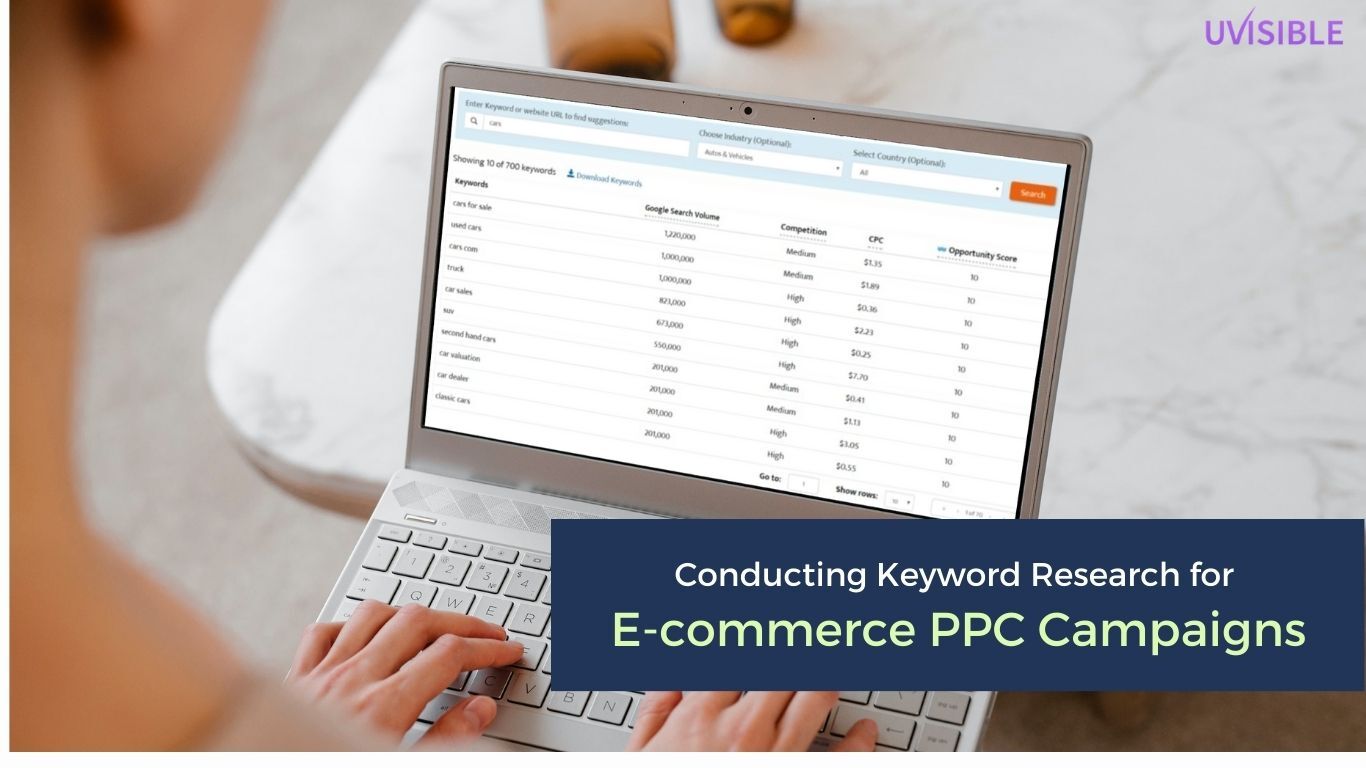
Keyword research is a critical component of every Ecommerce PPC strategy and it goes the same for other eCommerce businesses as well.
You must learn what search phrases your potential consumers are using to build ads that will appear when they search for those terms.
With eCommerce, it’s extremely vital to select keywords that are related to your items and your target audience.
You may use Professional SEO software tools like Google’s Keyword Planner or SEMrush to locate high-volume keywords with low competition.
You should also think about using long-tail keywords, which are more specific and may have lower search volume but higher intent.
Better Ad Targeting
Your ad targeting or text must capture the attention of potential customers and entice them to visit your website.
When creating PPC for eCommerce sites ad copy, it’s critical to emphasize your items’ unique value propositions, such as their quality, cost, or features.
Use language that resonates with your target audience and emphasizes the benefits of your products.
Include appealing calls-to-action (CTAs) that inspire visitors to take action, such as “Buy Now” or “Get Yours Today”.
Reports revealed that Personalized CTAs outperform non-personalized CTAs by 202%.
They are also known as smart CTAs because they are dynamic and change based on factors such as physical location and whether a user has previously visited the site.
Setting Up Conversion Tracking and Goal Tracking in Google Ads
Conversion monitoring is critical for determining the success of your Ecommerce PPC strategy.
You must be able to track which advertisements get the most conversions, which landing pages work effectively, and which keywords generate the most income.
You can analyze your ROI and make educated decisions about how to tailor your ads for better results by enabling conversion monitoring and goal tracking in Google Ads.
Understanding the Different Ad Formats Available in PPC Advertising
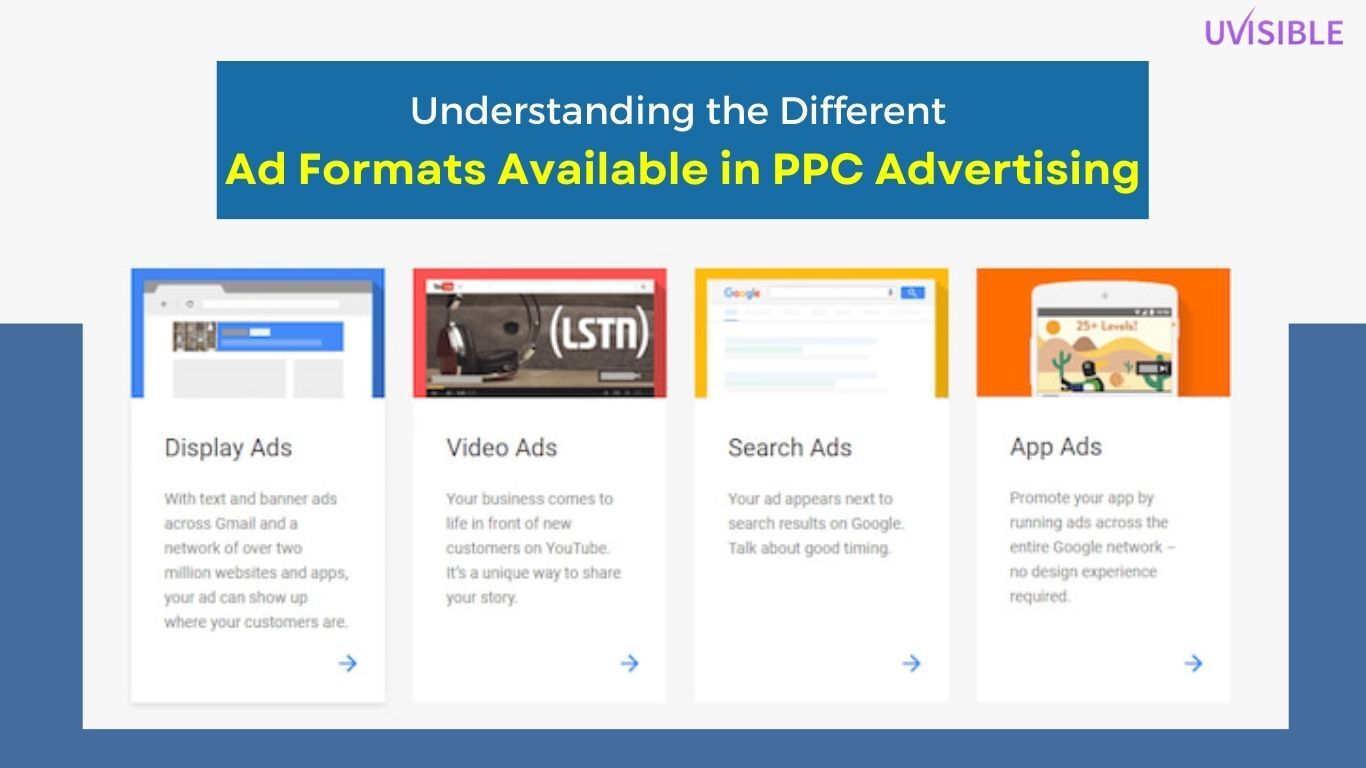
There are various sorts of ad formats accessible in PPC for eCommerce sites advertising, including search advertisements, display ads, shopping ads, and video ads.
Each format has advantages and disadvantages, and it is critical to select the best format for your specific eCommerce business.
For example, shopping ads are ideal for showcasing products and driving traffic to specific product pages, while video ads can be great for building brand awareness and engaging with potential customers.
Designing a Seamless Shopping Expereince through Effective Campaigns
Shopping campaigns are a sort of Ecommerce PPC strategy and campaign that allows you to directly market your items within Google search results.
To establish an efficient shopping PPC Campaign Setup, you must first create a product feed that includes all necessary information about your items, such as the product name, description, price, and image.
In addition, you should create custom labels to arrange your items and bid intelligently to guarantee that your products show in the most relevant searches.
Add Negative Keywords to Reduce Wasted Ad Spend
Negative keywords are search terms for which you do not want your advertisements to appear.
You can avoid having your ads appear for irrelevant or low-intent searches by including negative keywords in your PPC for eCommerce sites campaign.
This can help you reduce wasted ad spend and improve the overall ROI of your campaigns.
You may find irrelevant keywords and add them to your negative keyword list using tools like Google’s Search Terms report.
A/B Testing Ad Copy, Landing Pages, and Bidding Strategies
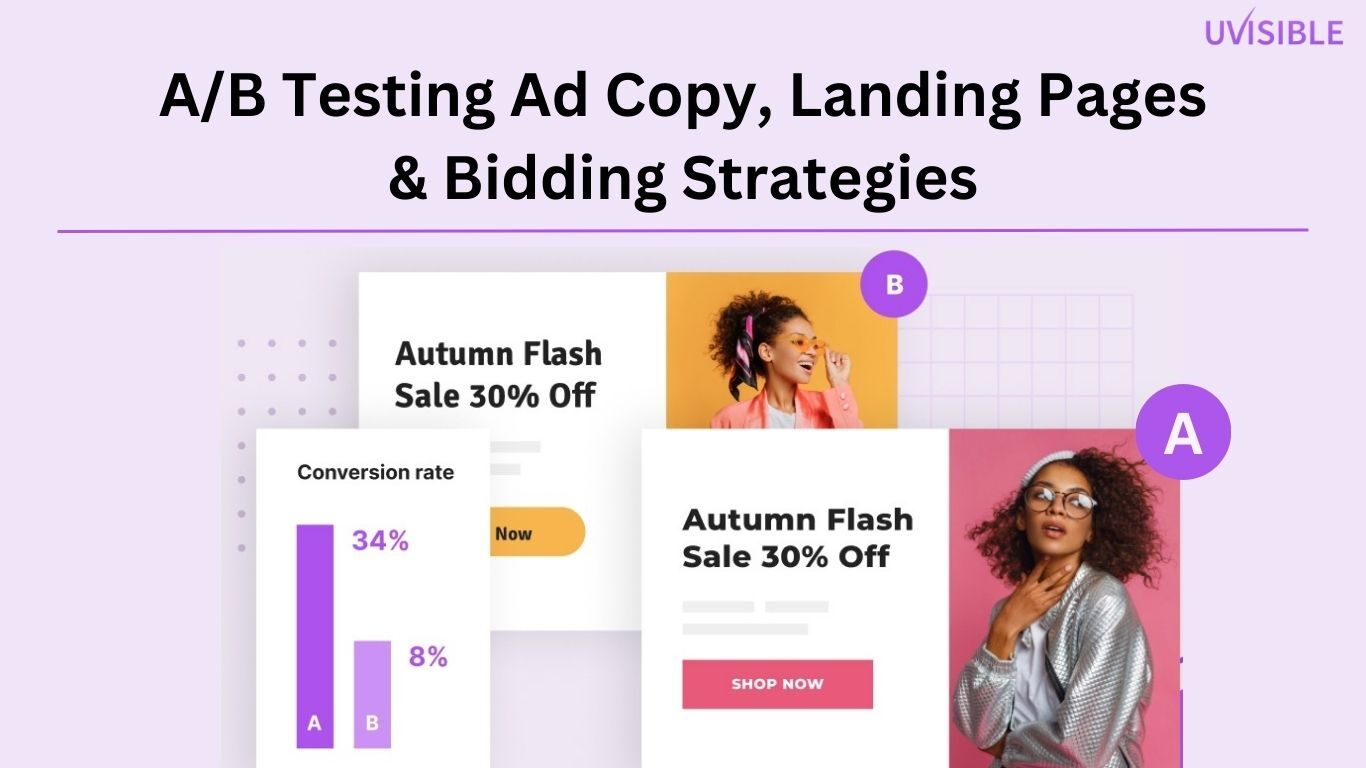
A/B testing is the process of testing different variations of your ads, landing pages, and bidding strategies to see which ones perform the best.
By doing A/B testing, you can make data-driven decisions on how to optimize your ads for greater success.
For example, you could test two versions of your ad copy to see which one gets more clicks, or you could test different landing page designs to see which one gets more conversions.
Incorporating Video Ads and Display Ads into Your PPC Strategy
Video advertisements and display ads may be great strategies to enhance brand recognition and connect with potential buyers, given how crucial they are in terms of B2B Digital Marketing Trends.
Video ads are especially effective for demonstrating product features or demonstrating how your products solve a specific problem.
Display ads can be used to target specific audiences with eye-catching visuals and compelling messaging.
When combining video advertisements and display ads into your Ecommerce PPC Strategy, it’s crucial to generate high-quality, compelling content that connects with your target audience.
These types of PPC ads also highlight this strategy’s true benefits of digital marketing for eCommerce.
Utilize Customer Retargeting and Lookalike Audiences to Drive Conversions
The method of targeting visitors who have previously interacted with your website or products is known as remarketing.
You may persuade these people to return to your site and finish a transaction by targeting them with targeted adverts.
Lookalike audiences are similar to remarketing audiences but target individuals who have similar qualities to your existing clients.
You may reach new prospective clients who are likely to be interested in your items by targeting lookalike audiences.
Leveraging Artificial Intelligence and Machine Learning in PPC Advertising
Artificial intelligence and machine learning may be utilized to improve the success of your PPC for eCommerce.
Google’s Smart Bidding, for example, uses machine learning to automatically adjust your bidding strategy based on user location, device type, and time of day.
Adext, an AI-powered ad platform, uses predictive algorithms to optimize ad campaigns in real time.
You can improve your ROI and reduce wasted ad spend by incorporating AI and machine learning into your PPC for eCommerce site advertising.
Especially, after the advent of ChatGPT, PPC ads have encountered a new angle in terms of ad creation and keyword research. So, using ChatGPT for PPC can add freshness to your ad campaigns.
Optimize Product Pages
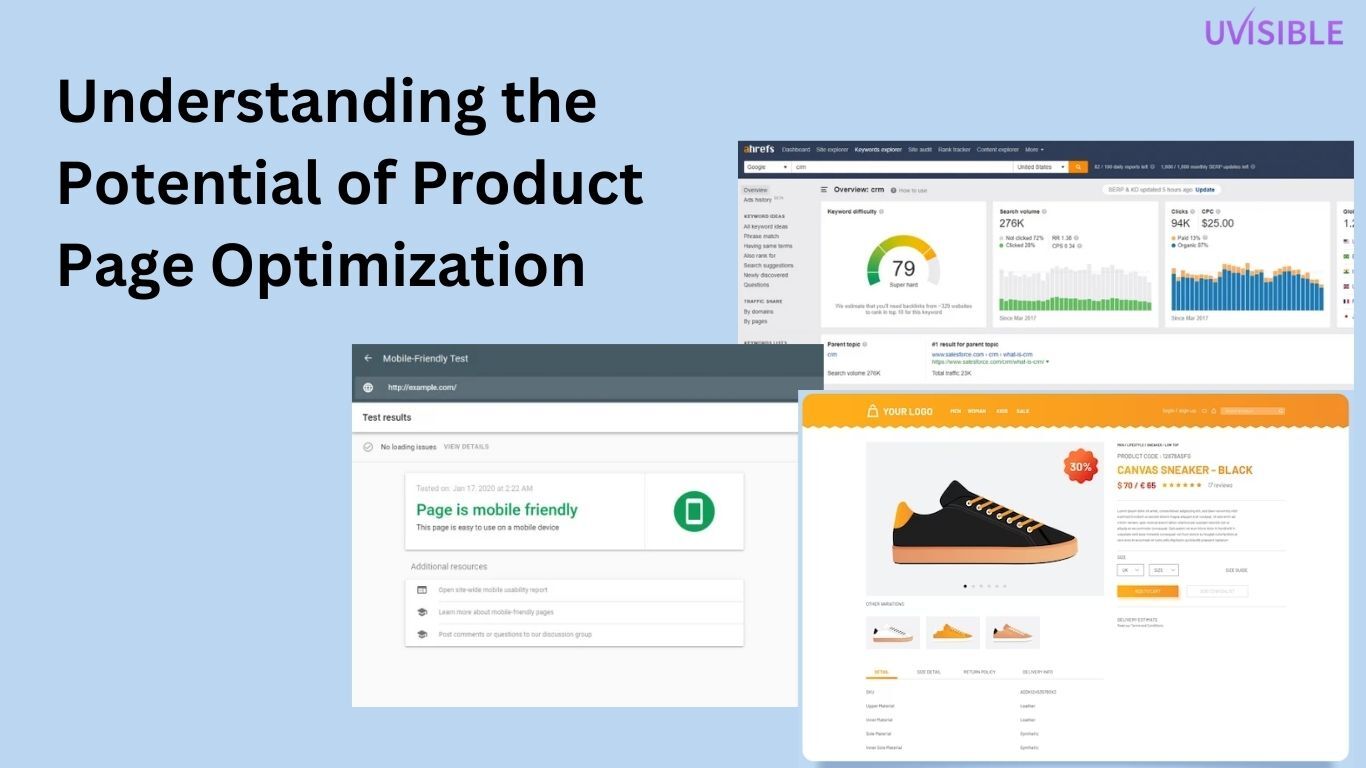
Your product pages are where potential buyers will choose to acquire your stuff.
To improve your conversion rates, make sure your product pages are well-designed, informative, and simple to navigate.
Add high-quality photographs of your items, informative descriptions, and customer reviews to assist customers in making an informed selection.
To improve the user experience, ensure that your product pages are mobile-friendly and optimized for fast loading times.
To gain further expertise in eCommerce Product page optimization, do check out our Ecommerce Product Page SEO Guide.
Running PPC Ads on your Social Media Handles
Social media networks like Facebook, Instagram, and Twitter provide formidable advertising tools that may be utilized to reach new prospective clients and increase conversions.
To run an effective Ecommerce PPC Strategy on your social media accounts, you must first set up a business account and an ad campaign.
You can target specific audiences based on factors like age, location, interests, and behaviour.
Create eye-catching visuals and compelling messaging to pique the interest of potential customers and entice them to visit your website.
Want to dominate the Facebook Ads market with result-driven strategies? Hire Uvisible as your Perfromance-based Facebook Ad Agency NOW!
Update Product Feed for Successful eCommerce Advertising
Your product feed is an important part of any Ecommerce PPC strategy and campaign. It includes all of the details about your products, such as the title, description, price, and image.
By keeping your product feed up-to-date, you can ensure that your advertising is providing the most accurate and relevant information to potential buyers.
Be sure you routinely update your product feed to reflect changes in pricing, availability, or product information.
You can also use optimization tools, such as Google’s Merchant Center, to improve the quality of your product feed and boost the visibility of your ads.
Speak to Shop: How Voice Search is Transforming PPC for eCommerce Sites
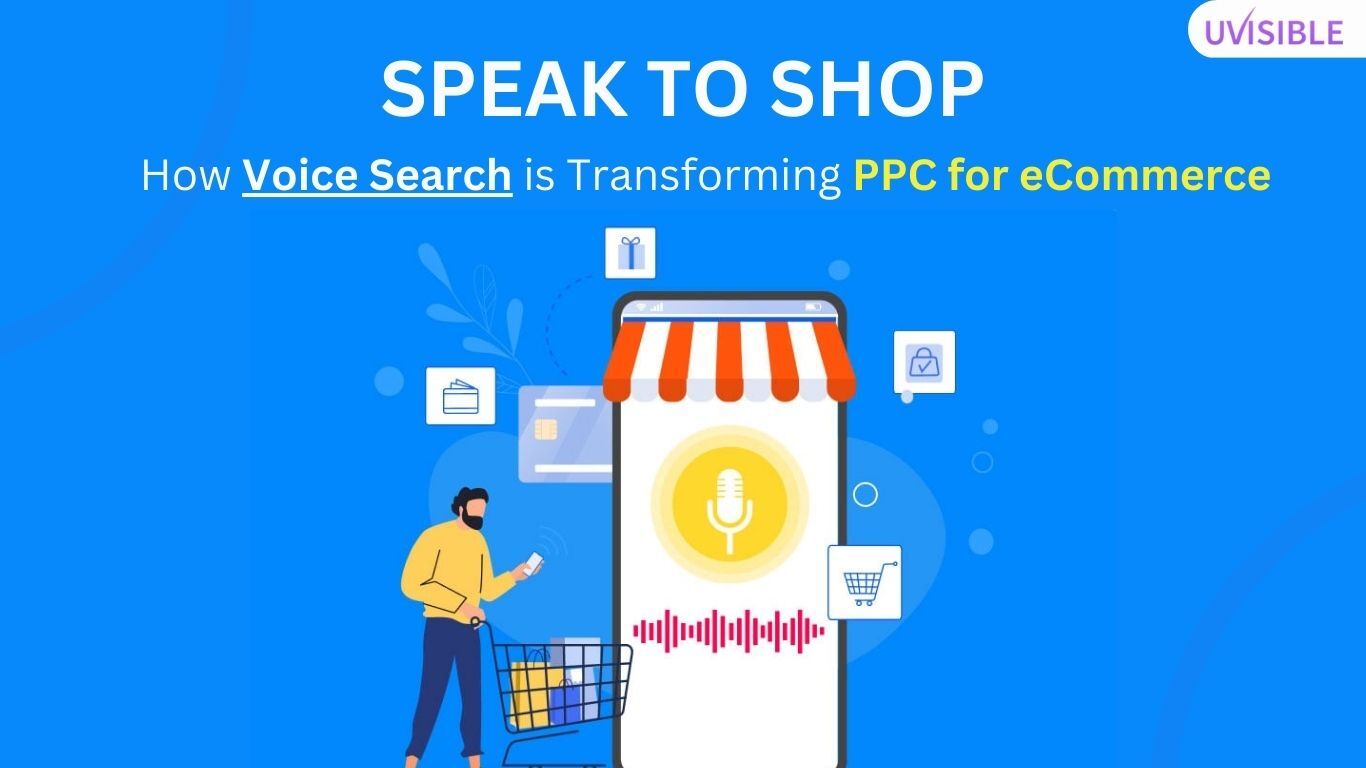
Voice searches are one of the rising SEO Trends in 2024.
Smart speakers, which are driven by a voice-enabled virtual intelligent assistant, serve as the core controlling hubs for many smart home operations.
They are used for entertainment, answering queries, surfing the web, and a variety of other tasks, like asking, ‘Alexa buy me a Monopoly board game’, and so on.
The ubiquity of smart speaker devices in households worldwide has progressively increased in tandem with the growing popularity of smart home technologies.
The global smart speaker market is expected to exceed 200 million units by 2023, a figure that will rise in the coming years.
When it comes to PPC for eCommerce site campaigns, integrating voice search is becoming increasingly important.
Voice search enables users to ask a question and receive an immediate response, which is excellent for eCommerce businesses looking to deliver rapid answers to their clients.
Ecommerce PPC strategy and campaigns by targeting long-tail keywords and optimizing for natural language search inquiries.
As various marketing reports have highlighted that the total global transaction value of voice assistant-enabled eCommerce purchases is expected to rise from US $ 4.6 billion in 2021 to US $19.4 billion in 2023.
This represents a 400% increase in just two years, driven by the growing opportunities for voice assistants to purchase items, primarily via smartphones and smart home devices.
This growth may turn over a new leaf, especially for the new digital marketing trends, as voice searches lead to improved targeting, enhanced client happiness, and, eventually, more revenue.
Voice search also offers a more comfortable and hands-free user experience, allowing users to look for items or services while performing other chores.
By integrating this technology, eCommerce businesses may provide a more customized and frictionless buying experience, perhaps leading to increased consumer loyalty.
YouTube Ads for Ecommerce Business are Game-Changer!
YouTube Ad Services in recent times have become one of the greatest platforms and PPC strategies for eCommerce companies owing to their enormous popularity, efficacy in reaching a huge audience, and development of a low-cost advertising campaign.
And, to support this statement, we would like to mention YouTube-related facts:
- Average CPV: $0.026 (approx.)
- Average View Rate: 30-32%
- Average View CTR: 0.4-0.5%
YouTube, with over 2 billion active users and an average daily watch time of over one billion hours, allows eCommerce businesses to access a large audience through customized advertising.
Ecommerce companies may use YouTube’s targeting features to build ads that specifically target their targeted audience based on demographics, interests, and behaviors.
This can lead to a greater ROI and more efficient use of advertising funds.
Furthermore, YouTube has a distinct edge over other advertising platforms in that it allows eCommerce businesses to display their products and services through video content.
This not only helps buyers comprehend the items they’re interested in, but it also allows businesses to demonstrate their brand personality and develop trust with their target audience.
Launch Search Competitor Campaigns and Elevate your Ecommerce Presence
Embrace a dynamic Ecommerce PPC strategy designed to propel your brand forward. Unleash the potential of PPC for Ecommerce sites by incorporating targeted tactics to outshine your competition.
Initiate the power move of launching Search Competitor Campaigns, a game-changing strategy that revolves around strategically utilizing competitors’ keywords and bids.
By doing so, you directly target your major adversaries, ensuring your brand stays prominently in the competitive landscape. Rest assured, your rivals are likely employing similar tactics against your ads.
Not familiar with your competition?
Kickstart your insights with cutting-edge Google Ads competitor research tools such as SEMrush, SpyFu, Ahrefs, and so on.
Blend this proactive approach seamlessly with your routine search ads to broaden your audience reach, creating a formidable barrier that makes it challenging for competitors to gain an upper hand.
This PPC strategy for Ecommerce harmoniously integrates precision and assertiveness to fortify your online presence.
Unleash the Power of Performance Max
Performance Max campaigns (PMax) have taken the eCommerce PPC world by storm, and for good reason.
This forward-thinking PPC strategy for eCommerce transcends conventional single-channel campaigns by harnessing the power of product feeds.
Through its omnichannel proficiency, it dynamically generates ads across search, display, Gmail, YouTube, and Discover. To optimize performance max campaign, delve into the innovative “max campaign” approach, enhancing your campaign’s efficiency without expanding the word count.
Here’s how PMax can supercharge your PPC keyword strategy for eCommerce:
- Category and Brand Domination: Forget siloed campaigns! PMax empowers you to run category-specific campaigns alongside brand-focused efforts. This allows you to conquer broader audiences interested in your product categories while simultaneously solidifying your brand presence.
- Dynamic Ads, Optimized Reach: PMax ditches the one-size-fits-all approach, dynamically combining your assets (text, images, videos) into countless ad variations. This AI-powered alchemy ensures your ads reach the right people on the right platforms at the optimal time, maximizing conversions and ROI.
- Unlock Hidden Audiences with Audience Signals: Take your targeting to the next level with PMax’s “Audience Signals” feature. Feed it competitor URLs as signals, and Google’s smart algorithms will identify and target users similar to your competitors’ audience. This opens doors to untapped potential customers who are already primed for your offerings.
- Continuous Optimization, Effortless Management: Sit back and watch PMax work its magic. Its machine learning engine continuously analyzes performance, adjusting bids and ad placements in real-time to optimize for your chosen goals, be it sales, leads, or website traffic. This frees you up to focus on other strategic aspects of your business.
Finding the Right PPC Agency for Ecommerce: Factors to Consider
Selecting the PPC agency for the best Ecommerce PPC Strategy may make or break your online advertising efforts.
For that, you may be required to Outsource PPC Services, if you want to witness a ramp-up in your sales and concentrate on your eCommerce business growth.
While looking for a PPC agency, consider the following factors:
Experience
Search for an agency with industry experience and a demonstrated track record of accomplishment.
A PPC for eCommerce agency with experience in your unique market segment will understand how to successfully target your audience and achieve the most Return for your advertising spend.
Services
Be certain that the PPC firm you select provides a comprehensive Ecommerce PPC strategy and services that your company requires.
Several PPC for eCommerce site agencies specialize in specific aspects of the industry, such as social media marketing or search engine marketing.
Decide which services are required for your eCommerce firm and then select an agency that can handle those requirements.
Team
Evaluate the agency’s staff size and competence.
A small team may be able to deliver more individualized attention, yet a larger organization may have greater resources and specialized experience.
Ascertain if the agency’s PPC personnel are certified and experienced in managing your campaigns.
Communication
Search for a responsive and communicative agency.
You’ll want to deal with a staff that is open and honest about the status of your efforts.
Select an agency that places a premium on communication and has a dedicated account manager who can answer your queries and offer frequent updates.
Pricing
Compare the price structures of various PPC agencies.
Determine if an agency will charge you a flat price or a portion of your advertising budget.
Be certain that the agency’s pricing is straightforward and that there are no hidden fees.
Also, when it comes to Pricing often people try to evaluate their digital marketing strategies by comparing two of the most used marketing practices SEO and PPC. To develop a more clear understanding, do check out SEO vs PPC: Which is Better?
Reporting
Be certain that the agency delivers regular and detailed updates on the performance of your campaign.
You should look at data like click-through rates, conversion rates, and return on ad expenditure.
The PPC for eCommerce agency should be able to explain the statistics and provide suggestions for improving your efforts.
Clientele
Search for a firm that has dealt with companies comparable to yours.
This might indicate that the agency knows your sector and has worked with customers with comparable needs in the past.
If you are a rising eCommerce business looking to skyrocket your sales and revenue!
It’s Time you Hire the Services of the Best Ecommerce PPC Agency for your eCommerce business.
Contact Uvisible NOW! And, Get the Opportunity to Talk to Our PPC Experts for Better Results!
Summing Up!
Ready to revolutionize your online presence?
Embrace the unparalleled potential of our Ecommerce PPC Strategy.
Wondering how to elevate your brand with a dynamic PPC Strategy for Ecommerce? T
ake charge of your success with strategic Ecommerce PPC Management.
Explore the possibilities and unlock the full potential of your online endeavors today.
FAQs
Q1. How to use PPC for ecommerce?
Use PPC for ecommerce by researching keywords, creating targeted ads, setting a budget, and analyzing data to optimize campaigns for sales.
Q2. How to Setup PPC for eCommerce?
Setup PPC for ecommerce by selecting a platform, creating an account, setting up billing, conducting keyword research, and creating targeted ads.
Q3. How to Structure PPC Campaigns for eCommerce?
Structure PPC campaigns for ecommerce by grouping keywords, creating targeted ad copy, optimizing landing pages, and testing and analyzing performance.
Q4. What is PPC in ecommerce?
PPC in ecommerce is a paid advertising model where advertisers pay a fee each time someone clicks on their ad, with the goal of driving sales and revenue.
Q5. Is PPC good for ecommerce?
Yes, PPC is good for ecommerce as it can increase visibility, drive targeted traffic to your website, and boost sales and revenue with a well-structured campaign.
About us and this blog
We are a digital marketing company with a focus on helping our customers achieve great results across several key areas.
Request a free quote
We offer professional SEO services that help websites increase their organic search score drastically in order to compete for the highest rankings even when it comes to highly competitive keywords.
Subscribe to our newsletter!
More from our blog
See all postsRecent Posts
- Landing Page Copy That Converts – Secrets Revealed December 16, 2024
- Understanding MTD, YTD, QTD, MoM, and YoY Metrics: A Comprehensive Guide December 12, 2024
- Learn How to Rank High on Google My Business: Guide to Master Local SEO December 7, 2024









Pingback: How to use ChatGPT for PPC? - Uvisible
Pingback: The Ultimate Outsource PPC Guide - Uvisible
Pingback: Can Google's AI-Powered Ads Campaign Boost Demand and Video Views? - Uvisible
Pingback: Google Ads vs Facebook Ads: Which Drives Better Results? - Uvisible
Pingback: Importance of Digital Marketing for ECommerce Sites - Uvisible
Pingback: Ultimate Guide to PPC Marketing: Boost your ROI Now - Uvisible
Pingback: Successful PPC Campaign: Step-by-Step Guide - Uvisible
Pingback: SEO vs PPC: Which is Better for Your Business Growth? - Uvisible
Pingback: 100+ PPC Terms: Demystifying the Terminology of PPC Advertising - Uvisible